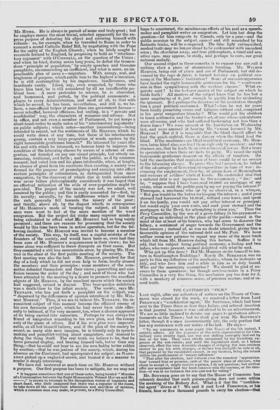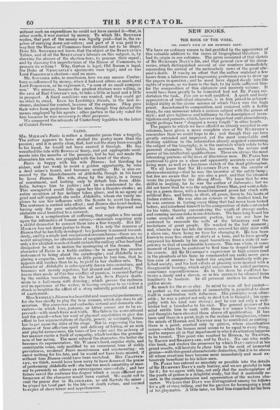THE CANTERBURY "MM."
LAST night, after our collection of notices on the House of Com- mons was closed for the week, we received a letter from Lord Foanwicifs "confidential agent," Mr. SOUTIIEE, which had been sent to the Times three or four days before, and refused insertion in that journal because it was considered to be an advertisement. We are as little inclined to devote our pages to gratuitous adver- tisements as the Times; but we shall give from Mr. SournEE's letter, though it comes inconveniently late, the only portion that has any connexion with our notice of his last. He says- " To my statements in your paper (the Times) of the 5th instant, I entirely adhere. All the expenses of the noble representative for Can. terbury were strictly legal, nor was one shilling corruptly laid out by him or for him. They were chiefly occasioned by the travelling ex- penses of the out-voters; and until the Legislature shall, as I before observed, effect the very desirable changes of obliging the non-resident elector to pay his own charges, or declare him ineligible to vote at all, that payment by the candidates cannot, in any fairness, bring the retura within the predicament of 'money influence.' "That after the election, and without even the remotest 'approxima- tion' toward hint or promise, such of the poorer class of electors, who chose to accept it, might receive a guinea, I do not question; but neither offer nor acceptance had the least concern with the canvass, or the elec- tion—it was in no instance the sine qua non for voting."
Mr. SOUTEIEE goes on to say that the House of Commons has solemnly decided that such guinea-giving does not come within the meaning of the Bribery Act. What is it that the "confiden- tial agent" drives at ? We said it cost Lord FORDWICH, or his friends', four or five thousand pounds to carry his election—that without such an expenditure he could not have carried it—that, in other words, it was carried by money. To which Mr. SOUTHER replies, that part of the money was legally paid—that is, the ex- pense of carrying down out-voters; and part of it was paid in a way that the House of Commons have declared not to be illegal. Does Mr. SOUTHEE not know, that the object of the SPECTATOR'S Tables, and of all the SPECTATOR'S labours on this subject, is, by showing the abuses of the election-laws, to procure their repeal ; and by showing the imperfections of the House of Commons, to procure its reform ? Why, Gatton is legal, Old Sarum is legal, the Duke of NEWCASTLE'S ejechnents were legal ; and so was Lord FORDWICH'S election—and no more.
Mr. SOUTHEE asks, in conclusion, how we can accuse Canter- bury as influenced by Money, when it had cost others so much, and Lord FORDWICH, as he expresses it, "a sum of so small compari- son." We answer, because the prudent electors were willing, in the case of Earl COWPER'S son, to take a little in hand and a little in prospect. A third candidate was wanted, and they could get no other to stand. Even his Lordship's friends, in the first in- stance, declined the contest, because of the expense. They gave their votes from preference for the man, though they detested the means employed by his agents : other parties in the city voted for him because he was necessary to their purposes. We commend the advocate of Canterbury legalities to the letter of' Colonel JONES.



























 Previous page
Previous page